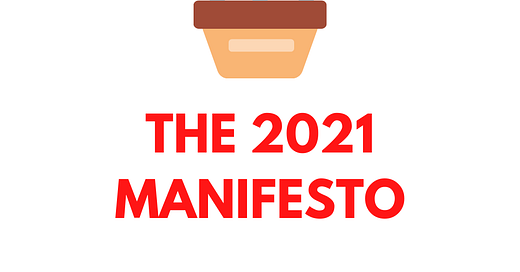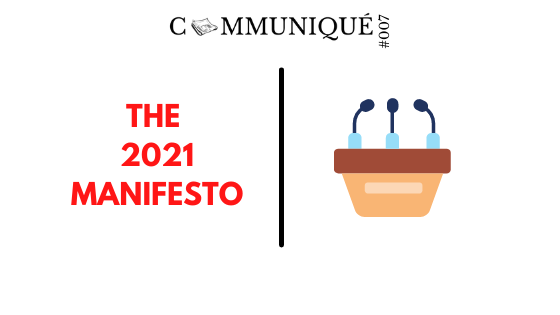Communiqué 07: The 2021 manifesto
I started Communique in May 2020 with a simple goal. Here's what I've learned publishing the newsletter for the past eight months and how it will evolve going forward.
This is a monthly newsletter about media in Nigeria, you can subscribe here so you don't miss any edition:
I started Communique in May 2020 with a simple goal to find out if people were interested enough in a constant and extensive analysis of Nigeria’s media industry. Ben Thompson’s work with Stratechery and Jason Njoku’s writing about the consumer Internet business in Nigeria inspired me to make the jump. But I needed proof that this was worth exploring.
In edition zero, I wrote:
There is so much going on [in Nigeria’s media industry] and not enough analysis -- analysis that provides more in-depth insight, greater context, and raises the quality of our conversations.
This is not an indictment on anyone; it simply is a function of need and interest -- is anyone interested enough in the media to constantly and extensively write about it, and are there enough people who need and are interested in reading this type of writing? I intend to find out.
Communique (pronounced ‘Koh-miu-nee-kay’) is an experiment and, so far, it is working. Since the newsletter went live eight months ago, it has gained 274 subscribers from 7 entries (6 essays + the introductory post). That’s an average of 39 new subscribers per post. It has an average open rate of 52.6% and, collectively, has been read over 4,500 times.
Are these numbers great? I’m unsure. But they are encouraging. I think they prove that there is enough interest to warrant a more significant commitment to the cause. The best performing essays also give a clue as to what topics people care about the most. The top 3 are:
Together, those three essays make up over 66% of the page views. The top-ranking essay dissects Netflix’s strategy in Nigeria, and the next two explore the challenges and limitations of journalism in Nigeria. The second and third-ranking essays especially generated heated conversations, with the third attracting a certain level of vitriolic comments (about journalism) on Facebook. So, what does this mean? What have I learned publishing this newsletter for the past eight months? And how will the learnings impact the newsletter going forward?
What I have learned publishing Communique so far
Journalism is a hot topic. It will attract views and generate engagement. However, it requires a far more nuanced approach to exploring its current state of affairs and the events that led up to it. Also, Nigerian journalists need to do better at telling their own stories. This will help more people understand the intricacies of doing good journalism in a country that is not designed to encourage it. It will also give prospective investors a clearer view of the market and spotlight potential growth opportunities. (I think Luminate Group’s investment in Stears and a few other unannounced investments indicate that there is interest worth examining.)
The intersection of media and technology deserves more analysis than it currently gets, particularly its impact on culture and business. For example, how Instagram’s algorithmic shift in focus from people to commerce has influenced how users behave and do business on the platform. Another example is how Facebook’s push to integrate all its platforms (WhatsApp, Instagram, Messenger) has impacted user behaviour and e-commerce. I think the success of my essay explaining Netflix’s Nigeria strategy is reasonable proof that there’s an appetite for more of this type of analysis.
There is a gap for a more deliberate approach to community integration around the media in Nigeria. There are already people creating communities in silos, but I think there should be better integration of these communities. There are conversations to be had that can only blossom when there is higher quality information available to everyone, and when knowledge is more democratised. We need to have these conversations openly on as many platforms and in as many accessible formats as possible.
The scarcity of data and quality information is an enormous problem. I try to be as analytical with Communique as possible. However, it is often difficult to find high-quality data and information to inform my analysis. The data that I get is sometimes too limited to give me the quality of insight needed. This a challenge that Osarumen Osamuyi (who authors The Subtext, a tech analysis publication) talks about on this episode of The Flip Africa podcast. He says:
“…One of the biggest assets that Stratechery has is high-quality sources of information. I would love to wake up every morning, scan through the news headlines, and write 1,800 words of commentary about what’s happened. But I just can’t do that today because lots of the information I need to inform my analysis I have to gather originally. Like to write a 3000-word article, I’m probably doing a couple of interviews, and probably reading papers. I’m probably reading, in some cases, like a book or two just to get to the amount of information density that I can begin to sift through and do some analysis. And so that’s why it’s really, really difficult to make this work at scale because you’re both doing the job of the journalist and the analyst.”
What is the plan going forward? Cue the 2021 manifesto
A few things will change about Communique in 2021. Some different from what it currently offers, and others amplifications of what already exists.
Community integration. In 2021, I will actively seek out communities where conversations akin to what I write about in the newsletter already happen. Then, I will attempt to integrate these communities and expose you to them as much as possible. This will happen primarily via virtual and limited physical events, panel discussions, and live interviews. There will also be frequent Q&A’s and ask-me-anything sessions with interesting people. Here, I will need your help to identify who you think I should be talking to and topics we should discuss. Please, leave your suggestions in the comment section or send me an email: hello@davidadeleke.com.
More stories about the intersection of tech and media in Nigeria (and Africa). Big tech companies and investors have been paying more attention to Nigeria and Africa. This has resulted in more funding for startups, recent exits for Jumia and Paystack, and investment in local content for a global audience (case in point, Netflix and Disney). I expect more of the later to happen in 2021, and I anticipate many of the moves that have happened behind-the-scenes in the last few years will come to the fore. (For example, we will know just how much African creatives were involved in the upcoming Coming to America sequel.) As more of these kinds of stories develop, you will read their analysis and exploration in this newsletter. This also means that I will attempt to reach beyond Nigeria’s shores to look at stories that may not directly affect this market but are relevant to its development.
Profiling people and companies to make up for the scarcity of high-quality data and information. One way to make up for this shortage of data and information about the media business in Nigeria has been to do profiles that provide relevant anecdotal evidence. I did this with episode 2 and episode 4, and I expect to do more of this in 2021. If you think that there are people and companies I should be profiling and you can help with introductions, please let me know in the comment section or send me an email.
The contributor programme. To increase the newsletter’s output while preserving the quality of its analysis, I am introducing the Communique Contributor Programme in mid-2021. There are so many things happening within the industry and more stories developing in the background than I can keep up with individually. Therefore, the contributor programme will seek to mitigate this challenge, leveraging a network of incredible writers around the continent while providing them with a reasonable earning for their stories (selected writers will be paid per post). Fortunately, Substack allows multiple authors per publication. I hope that this programme will grow into something bigger than Communique and become a channel that introduces you to more high-quality thinkers and writers in media in Africa.
I am excited about 2021 in ways that I can’t explain. More than ever, I see the value of digitisation and virtual communities, and Communique is tapping into these, providing a different dimension to how we think about the media business and media technology in Nigeria (and Africa). Communique is expanding to analysing media in Nigeria (and Africa), no longer just the Nigerian media industry. Join me.
If you have ideas, please send your replies, leave your comments, or shoot me an email: hello@davidadeleke.com.
Happy New Year!
If you enjoyed reading this, please like the post and tell other people about Communiqué.






Happy New Year David!
Can’t wait for the contents you’ll be dishing out this year.
This is exciting, David. Can’t wait.